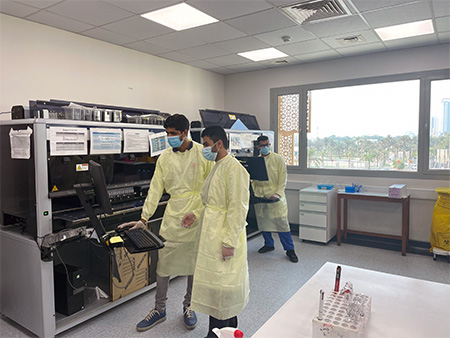 A key element in achieving the United Nations Sustainable Development Goals (SDGs) and implementing universal health coverage is having appropriate, effective health policies informed by sound evidence and data. Collecting timely and high-quality evidence becomes even more crucial during health emergencies, such as the COVID-19 pandemic, which demonstrated the importance of ensuring decisions remain informed by the best available evidence in a timely manner. WHO, in collaboration with countries in the Region, developed 15 case studies in 2021–2022, to showcase diverse experiences of the use of global, regional and national data and evidence to respond to COVID-19. The countries that participated included Afghanistan, Egypt, Iran (Islamic Republic of), Jordan, Libya, Morocco, occupied Palestinian territory, Oman, Somalia, Sudan, Syrian Arab Republic and Yemen, representing a variety of country income and emergency levels.
A key element in achieving the United Nations Sustainable Development Goals (SDGs) and implementing universal health coverage is having appropriate, effective health policies informed by sound evidence and data. Collecting timely and high-quality evidence becomes even more crucial during health emergencies, such as the COVID-19 pandemic, which demonstrated the importance of ensuring decisions remain informed by the best available evidence in a timely manner. WHO, in collaboration with countries in the Region, developed 15 case studies in 2021–2022, to showcase diverse experiences of the use of global, regional and national data and evidence to respond to COVID-19. The countries that participated included Afghanistan, Egypt, Iran (Islamic Republic of), Jordan, Libya, Morocco, occupied Palestinian territory, Oman, Somalia, Sudan, Syrian Arab Republic and Yemen, representing a variety of country income and emergency levels.
Following completion of the case studies, the WHO Regional Office for the Eastern Mediterranean organized a two-day seminar on 26–27 October 2022, in Cairo, Egypt, to enhance the capacities of countries in the Eastern Mediterranean Region through the sharing of experiences and lessons learned from the case studies.
Related link
Case studies
|
Country |
Title |
|
Afghanistan |
Role of national household survey to prevent and reduce infodemic in Afghanistan |
|
Using national data for developing social and behavioral measures algorithm: evidence-informed policy-making during COVID-19 in Afghanistan |
|
|
Islamic Republic of Iran |
Establishment of a rapid response system to provide timely evidence for policy-making: a case study from the National Institute for Health Research in Iran |
|
Jordan |
Using local data and modelling to respond to COVID-19: A case study from the Ministry of Health in the Hashemite Kingdom of Jordan |
|
Libya |
Engaging stakeholders through training to increase covid-19 vaccine acceptance in Libya |
|
Morocco |
Continuity of healthcare services in Morocco during the COVID-19 crisis: using evidence to ensure anticipatory action |
|
Oman |
Knowledge, Attitude and Practice Survey for COVID-19 vaccination: a case study from the Ministry of Health in Oman |
|
Occupied Palestinian territory |
The PNIPH/WHO COVID-19 monitoring apparatus in the occupied Palestinian territory |
|
Pakistan |
Use of a national survey and stakeholder engagement to establish an online teaching system: a case study from Khyber Medical University in Pakistan |
|
Saudi Arabia |
Improving Uptake in Response to COVID-19 Pandemic in Saudi Arabia through raising awareness and local data: Lessons learned from an Academic Institution |
|
Somalia |
Using global evidence to inform risk communication and community engagement (RCCE) to respond to COVID-19 |
|
Sudan |
Sudan’s governance model in response to the COVID-19 pandemic |
|
Syria |
Use of evidence for policy-making in response to COVID-19 pandemic |
|
Yemen |
Use of local data and knowledge to respond to COVID-19: a case study From Syoun/Hadhramout, Yemen |
|
Bridging gaps between policymakers and experts to adapt global guidelines for the development of a national vaccination deployment plan: A case study from Yemen |








